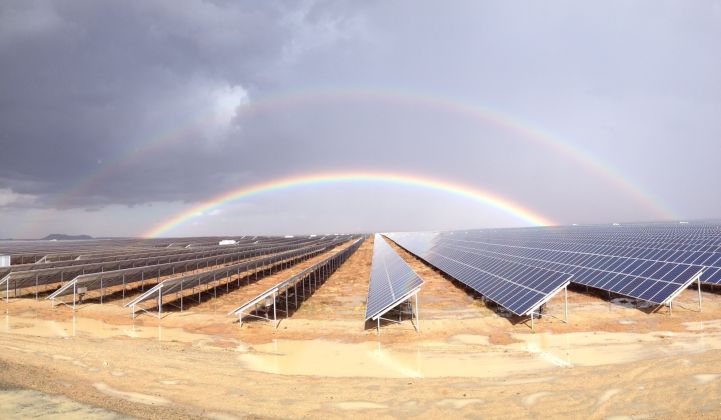One of the biggest U.S. solar stories of the summer was developer 8minute’s pricing record of $19.97 per megawatt-hour for a Los Angeles project.
The project, which looks set to go ahead following initial union resistance, remains a relatively rare public example of sub-$25 per megawatt-hour pricing in the U.S. market. Elsewhere, however, developers have already been bidding under $25 for several years.
Here are eight other countries where the $25-per-megawatt-hour barrier has tumbled, as tracked by the Wood Mackenzie Power & Renewables solar analysis team.
Jordan
China’s Jinko Power last year dipped under $25 per megawatt-hour with a price of $24.89 for 150 megawatts offered in Jordan’s Round III auction.
Alas, before the winner of the auction was announced, the country pulled the tender, citing the need for technical studies to confirm that the nation’s 3.6-gigawatt-capacity grid would be able to handle the impact of renewable energy plants of more than a megawatt.
Tunisia
The North African nation of Tunisia is soon expected to finalize the winners in a 500-megawatt tender that in July yielded five bids that were all records for the country, including one that was said to be the lowest ever seen in Africa.
The bid, from Norway’s specialist emerging markets developer Scatec Solar, came in at $24.40 per megawatt-hour. It is for a 200-megawatt project in Tataouine, a location until now best known for its role as another world in Star Wars.
United Arab Emirates
The United Arab Emirates became the first market ever to haul in solar for less than $25 per megawatt-hour when a 2016 tender yielded a price of $24.20. The bid was made by a consortium comprising the Abu Dhabi Power Corporation, China’s JinkoSolar and Japan's Marubeni Corp.
The resulting project, Sweihan, entered operation in July and is one of the biggest solar plants in the world, with nearly 1.2 gigawatts of capacity. The Emirates Water and Electricity Company is buying the entire output of the plant under a 25-year power-purchase agreement.
In October this year, neighboring Emirate Dubai teased a price of $16.90 for the fifth phase of the Mohammed bin Rashid Al Maktoum Solar Park. The winning bidder for the 900-megawatt installation has not been revealed as of the time of writing.
Saudi Arabia
Saudi Arabia’s stop-start solar policy has overpromised and underdelivered. But in 2017, the Kingdom was able to notch a world first when developer ACWA Power won a tender for a 300-megawatt project with a then-record price of $23.42 per megawatt-hour.
The Renewable Energy Project Development Office-sponsored Sakaka solar project tender was notable because ACWA Power wasn’t even the lowest bidder. Masdar and EDF jointly tabled a rival bid of $17.86, which was ultimately rejected for reasons that remain unclear.
Chile
Saudi Arabia’s record-beating bid took place in October 2017 — but it didn’t hold the crown for long. The following month, in Chile, the Italian developer Enel came forward with a price of $21.48 per megawatt-hour for a 116-megawatt project scheduled for 2024 in Antofagasta.
The bid came as part of Chile’s third government tender for energy and marked the second time the country has broken pricing records for solar. Lawmakers lauded the fact that 100 percent of the tender went to renewable energy, with an average price of $32.50 per megawatt-hour.
Mexico
The ink on Chile’s November 2017 tender outcome statement barely had time to dry before Mexico came forward with an even lower cost for solar. The French developer Neoen was not only able to undercut Enel but also became the first firm ever to bid below $20.
Neoen’s Pachamama solar plant was awarded a 15-year power-purchase agreement for electricity at just $18.93 per megawatt-hour. The ability to pick up additional revenue from clean energy certificates and merchant energy sales is likely a major factor in its pricing.
Brazil
Even today, getting solar power for less than $20 per megawatt-hour is no mean feat. So new world records, such as the one set by Brazil in July this year, has analysts searching for explanations.
In the case of the 163-megawatt Brazilian Milagres project, which was awarded with a price of $16.95 per megawatt-hour, the reason seems obvious: only 30 percent of the plant’s energy will be sold at the agreed tariff, with the rest going to bidders in the free market.
Portugal
No sooner had Brazil awarded the world’s cheapest solar pricing than an even lower bid appeared in Portugal. As with Milagres, analysts believe a $16.48-per-megawatt-hour bid in Portugal was only possible because a fair amount of the energy will be sold at a higher price.
“The bid prices are not reflective of the levelized cost of energy for utility-scale solar in Portugal," said Tom Heggarty, senior analyst at Wood Mackenzie Power and Renewables. "Bidders are planning to sell into the wholesale market at the end of the 15-year contracts."




